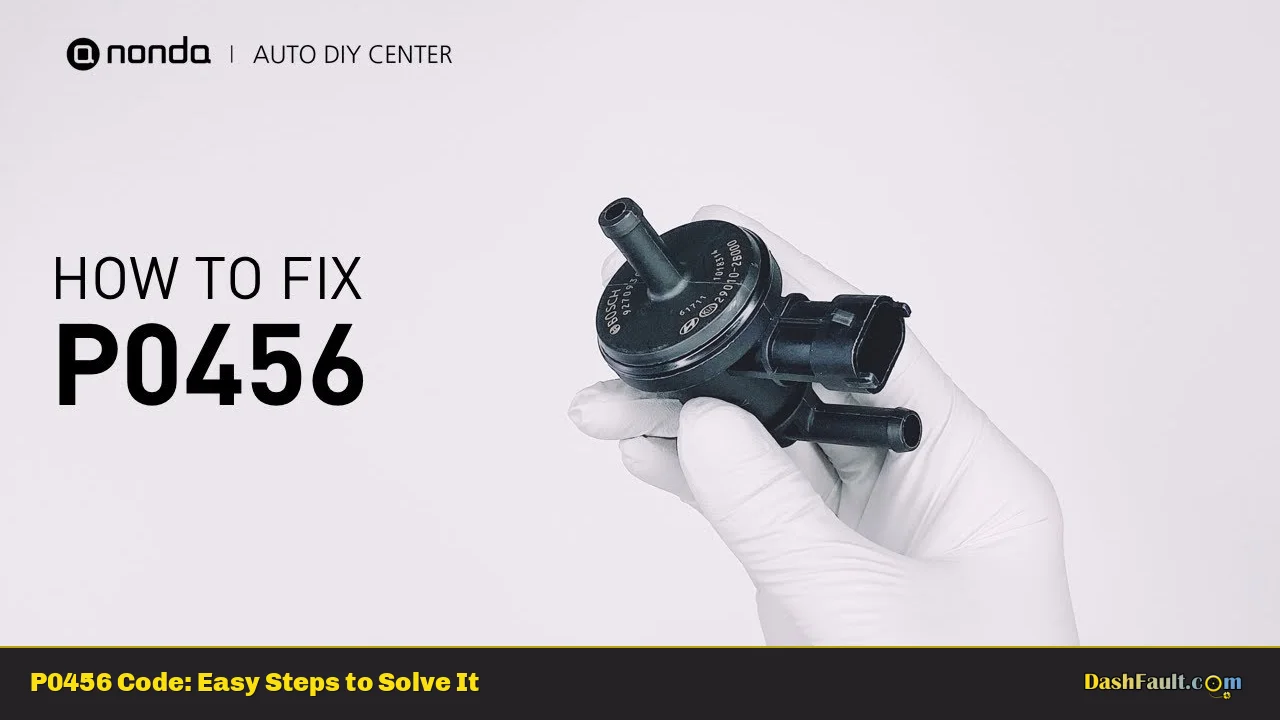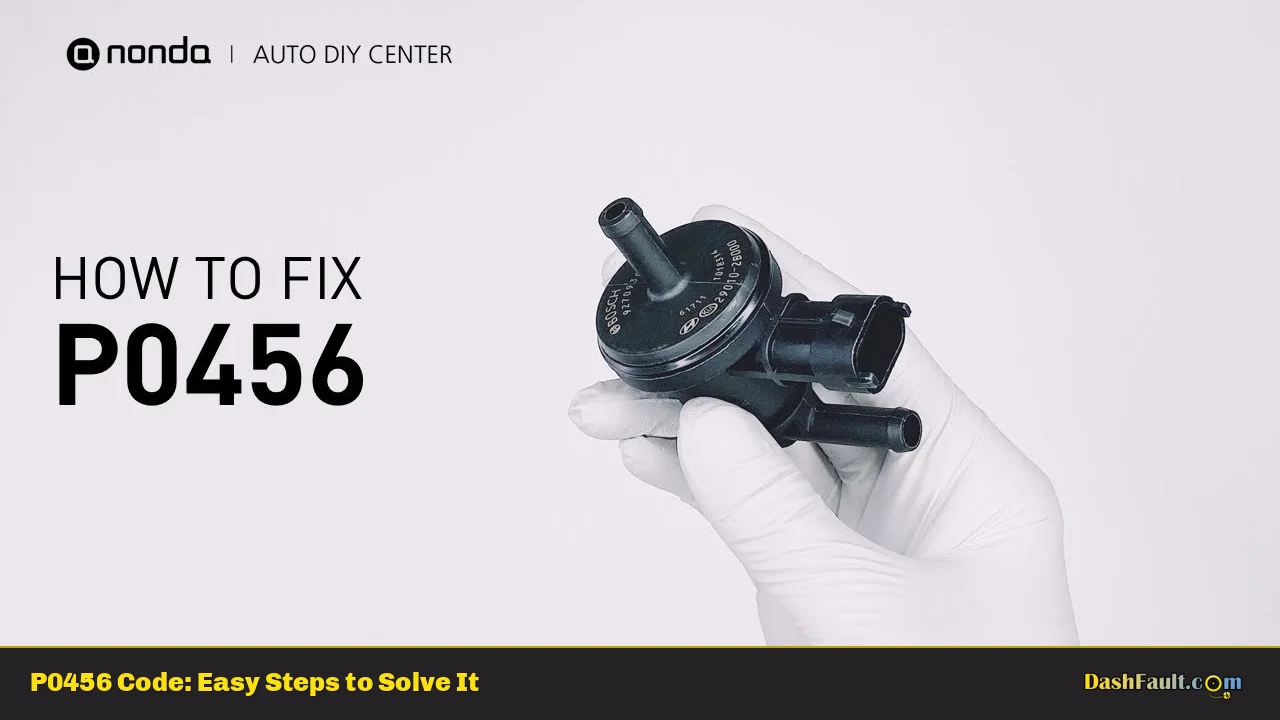The P0456 trouble code is a diagnostic trouble code (DTC) that indicates a small leak has been detected in the evaporative emission control (EVAP) system of a vehicle. This system is crucial for preventing fuel vapors from escaping into the atmosphere, thus reducing air pollution. When the engine control module (ECM) detects a leak during its self-diagnostic tests, it triggers the P0456 code and illuminates the check engine light on the dashboard. While this code often signifies a minor issue, it is essential to address it promptly to maintain compliance with emissions regulations and ensure optimal vehicle performance.
| P0456 Code Meaning | P0456 Code Common Causes |
|---|---|
| Evaporative Emission System Small Leak Detected | Loose or damaged gas cap |
| Minor leak in EVAP system components | Faulty EVAP hoses or connections |
| Leak detected during vehicle off testing | Defective charcoal canister |
| Faulty purge or vent control valve | |
| Cracked fuel tank or filler neck |
Symptoms of P0456 Code
When a P0456 code is triggered, the most noticeable symptom is the illumination of the check engine light. Other potential symptoms may include:
- A faint smell of gasoline, particularly when near the vehicle.
- Slight decreases in fuel economy over time.
- No noticeable changes in vehicle performance or drivability.
While these symptoms may seem minor, they indicate that there is an issue within the EVAP system that should be diagnosed and resolved to prevent further complications.
Technical Explanation
The EVAP system is designed to capture and recycle fuel vapors from the fuel tank before they can escape into the atmosphere. It consists of various components, including:
- Charcoal canister: Stores fuel vapors until they can be purged into the engine for combustion.
- Purge valve: Controls the flow of vapors from the charcoal canister to the engine.
- Vent valve: Allows air to enter the EVAP system during purging.
- EVAP hoses: Connect various components of the system and transport vapors.
The ECM performs periodic tests to check for leaks by creating a vacuum in the system or pressurizing it. If it detects a drop in pressure or vacuum that indicates a leak, it sets the P0456 code.
Step-by-Step Diagnosis
Diagnosing a P0456 code involves several steps:
- Check for Additional Codes: Use an OBD-II scanner to check for any related trouble codes that may provide more context about the issue.
- Inspect the Gas Cap:
- Ensure that it is securely tightened and not damaged.
- Replace if necessary, as a faulty gas cap is one of the most common causes of this code.
- Visual Inspection of EVAP Components:
- Examine hoses and connections for cracks, splits, or disconnections.
- Look for signs of wear or damage on valves and other components.
- Smoke Test:
- Perform a smoke test on the EVAP system to identify small leaks that may not be visible during a visual inspection.
- Test Purge and Vent Valves:
- Check for proper operation of both valves using a multimeter or by applying vacuum pressure.
- Inspect Charcoal Canister:
- Look for cracks or damage that could allow vapors to escape.
- Check Fuel Tank Pressure Sensor:
- Ensure that this sensor is functioning correctly, as it plays a role in detecting leaks.
Solution Methods
Once you have diagnosed the cause of the P0456 code, you can proceed with repairs:
- Replace Gas Cap: If found faulty, replacing it is usually inexpensive and straightforward.
- Repair or Replace EVAP Hoses: If any hoses are cracked or damaged, they should be replaced to restore proper function.
- Fix Purge/Vent Valves: If either valve is not operating correctly, they should be repaired or replaced as needed.
- Replace Charcoal Canister: If damaged, this component will need replacement to prevent vapor leaks.
- Fuel Tank Repairs: If there are cracks in the fuel tank or filler neck, these may require professional repair or replacement.
Cost Estimates
The cost of diagnosing and fixing a P0456 code can vary significantly based on location and vehicle make/model:
- Diagnostic Fee: Typically ranges from $100 to $200.
- Gas Cap Replacement: Usually costs between $10 and $30.
- EVAP Hose Replacement: Costs can range from $50 to $150 depending on accessibility.
- Purge/Vent Valve Replacement: Usually between $100 and $300.
- Charcoal Canister Replacement: Costs can range from $150 to $500 depending on labor involved.
- Fuel Tank Repairs/Replacement: This could range from $300 to $600 if significant repairs are needed.
Overall, minor repairs can be quite affordable, while more extensive issues may lead to higher costs.
Warnings and Recommendations
It’s important not to ignore a P0456 code despite its seemingly minor nature. Here are some recommendations:
- Always start with checking and securing your gas cap before proceeding with further diagnostics.
- If you are not comfortable performing these checks yourself, consider seeking help from a qualified mechanic who can accurately diagnose and fix the problem.
- Delaying repairs can lead to increased emissions and potential failure in emissions testing, which could result in fines or additional costs for compliance repairs.
Closing Paragraph
In summary, while the P0456 trouble code indicates a small leak in your vehicle’s evaporative emission control system, addressing it promptly is crucial for maintaining your vehicle’s efficiency and compliance with environmental regulations. By following systematic diagnostic steps and understanding potential causes, you can effectively resolve this issue yourself or with professional assistance. Keeping your vehicle’s emissions system functioning properly not only helps protect the environment but also ensures your car runs smoothly without unnecessary complications.
Frequently Asked Questions About P0456
- What does the P0456 code mean?
P0456 indicates that a very small leak has been detected in your vehicle’s evaporative emission control system. - Can I drive my car with a P0456 code?
Yes, it is generally safe to drive with this code; however, you should address it soon to avoid failing emissions tests. - How do I fix a P0456 code?
Start by checking your gas cap; if it’s secure and undamaged, inspect other components like hoses, valves, and the charcoal canister. - Is it expensive to repair P0456 issues?
The cost varies widely but typically ranges from $50 for minor fixes like replacing a gas cap up to $600 for more extensive repairs. - How do I clear the P0456 code?
You can clear it using an OBD-II scanner after making necessary repairs; driving your vehicle through several cycles may also reset it. - What are common causes of P0456?
The most common causes include a loose gas cap, faulty EVAP hoses, defective purge/vent valves, and damaged charcoal canisters. - Will my car fail an emissions test with a P0456 code?
Yes, having this code present typically results in failing an emissions test due to increased hydrocarbon emissions. - How long does it take for a check engine light to reset after fixing P0456?
The light may reset after driving several cycles; alternatively, you can use an OBD-II scanner to clear it immediately.

